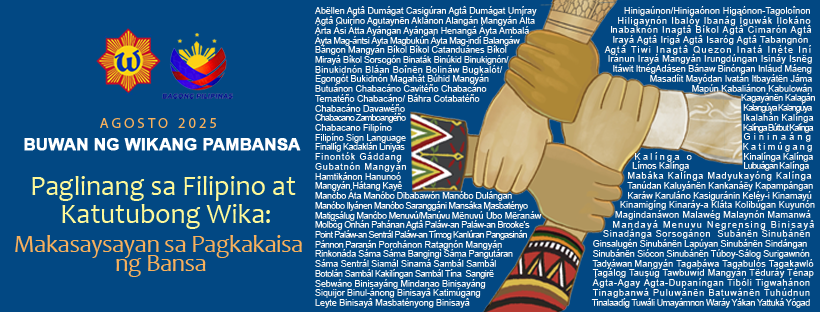
By Brian Campued
Language is not just a system of communication used by a particular community and conveyed by speech, writing, or gestures—it reflects the speaker’s sense of self. More than a tool for communication, language plays a crucial role in shaping identity and serves as a vehicle for preserving history and culture.
In culturally diverse countries such as the Philippines, one language stood the test of time as a pillar of national identity and unity—the “Filipino” language, as enshrined in Article 14 of the 1987 Constitution.
However, long before the present Constitution was crafted, the late president and “Ama ng Wikang Pambansa” Manuel Quezon issued Executive Order No. 134, s. 1937 stating that the national language will be based on “Tagalog”—one of the major languages in the country—prompting its use not just in education but also in mass media and official communication.
To affirm the designation of Filipino as the national language of the Philippines, the Komisyon sa Wikang Filipino (KWF) released Resolution No. 13-39, s. 2013, defining Filipino as the native language being used all over the country, orally as well as written, by native groups from all over the archipelago.
“Sapagkat isang wikang buháy, mabilis itong pinauunlad ng araw-araw at iba’t ibang uri ng paggamit sa iba’t ibang pook at sitwasyon at nililinang sa iba’t ibang antas ng saliksik at talakayang akademiko ngunit sa paraang maugnayin at mapagtampok sa mga lahok na nagtataglay ng mga malikhaing katangian at kailangang karunungan mula sa mga katutubong wika ng bansa,” the resolution stated.
This further supports the Constitution’s Article 14, Section 6, stressing that Filipinos “shall be further developed and enriched on the basis of existing Philippine and other languages.”
Filipino and native languages in PH
While Filipino and Tagalog are both considered a “language” in the country, resulting in confusion and being used interchangeably by the public, the terms differ in context.
In an interview on “Impormasyon at Aksyon” radio show hosted by the Philippine Information Agency on Aug. 11, KWF Chairperson Atty. Marites Barrios clarified that there are about 135 languages in the country used by several ethnic groups.
“Ang Filipino po ay amalgamasyon o konglomerasyon ng lahat ng katutubong wika sa Pilipinas at ang malaking bahagi nito ay ang Wikang Tagalog,” Barrios explained, saying that Tagalog, along with Cebuano, Ilokano, Waray, Hiligaynon, Kapampangan, Bikol, Pangasinan, as well as the Filipino Sign Language are referred to as “katutubong wika”.
These are further divided into dialects, or the variation of a native language used in a particular area, such as Tagalog-Batangas, Tagalog-Laguna, Tagalog-Rizal, or Tagalog-Quezon.
Out of the 135 native languages in the Philippines, the KWF classified 40 as either “definitively”, “severely”, or “critically” endangered—these languages face the risk of vanishing due to social, cultural, and political challenges that affect its preservation, usage, and development.
A specific language is considered endangered when the youth no longer use it verbally or in writing; and when the number of speakers is limited to senior or elder members of an ethnolinguistic group.
According to KWF’s repository, out of the 40 endangered native languages in the country, 22 are from Luzon, 10 are from Visayas, and 8 are from Mindanao.
Notably, the “Árta” language—used in Barangay Disimungal in Nagtipunan, Quirino by the ethnic community of the same name— faces the highest degree of danger as there are only 10 individuals left who can speak the language, based on KWF’s 2021 validation, most of whom are aged 50 and above.
When no known individual speaks a specific language, Barrios said, it will be classified as “extinct”.
“Nakakalungkot pong isipin na mayroon na po tayong mga patay na wika, ang lagi ko pong binibigay na halimbawa dito ay ang Inagtâ Isaróg,” she continued.
Saving Philippine languages from extinction
In its bid to save Philippine languages from the verge of extinction, the KWF launched various programs and continues to champion efforts to address disappearing languages, such as the “Bahay Wika” and “Master Apprentice Language Learning Program”.
“Hindi naman po nagpapabaya ang Komisyon sa Wikang Filipino na ang mga ito ay tuluyan na lamang mawala,” Barrios stressed.
Through these programs, the commission collaborates with the local government units to establish centers where expert speakers of endangered languages are being trained to teach their languages to the younger generation.
“Sa gayon, ang mga batang ito ay matututo na makipagtalastasan, makipag-usap, makipag-kuwentuhan sa wikang kanilang katutubo,” she said.
“Kasi alam niyo naman po, kapag kakaunti po ang gumagamit ng wika, numinipis po ito at hindi na po natin mamamalayan, mawawala,” she added.
As declared in Proclamation No. 1041, s. 1997, issued by then former President Fidel Ramos, the entire month of August is being celebrated annually as “Buwan ng Wikang Pambansa”.
This year’s theme: “Paglilinang sa Filipino at Katutubong Wika: Makasaysayan sa Pagkakaisa ng Bansa” aims to strengthen the use of Filipino as the national language while emphasizing the equal importance of other Philippine languages.
“Wala pong ibang magmamahal sa ating wika kung hindi tayo,” Barrios reminded the public.
“Kapag hindi po natin ginagamit iyan, ‘yan po ay maglalaho, mawawala… Ang ating wika ay isang instrumento na nagbibigkis sa atin bilang isang bayan at ito po ay dapat nating payabungin.”
-jpv
